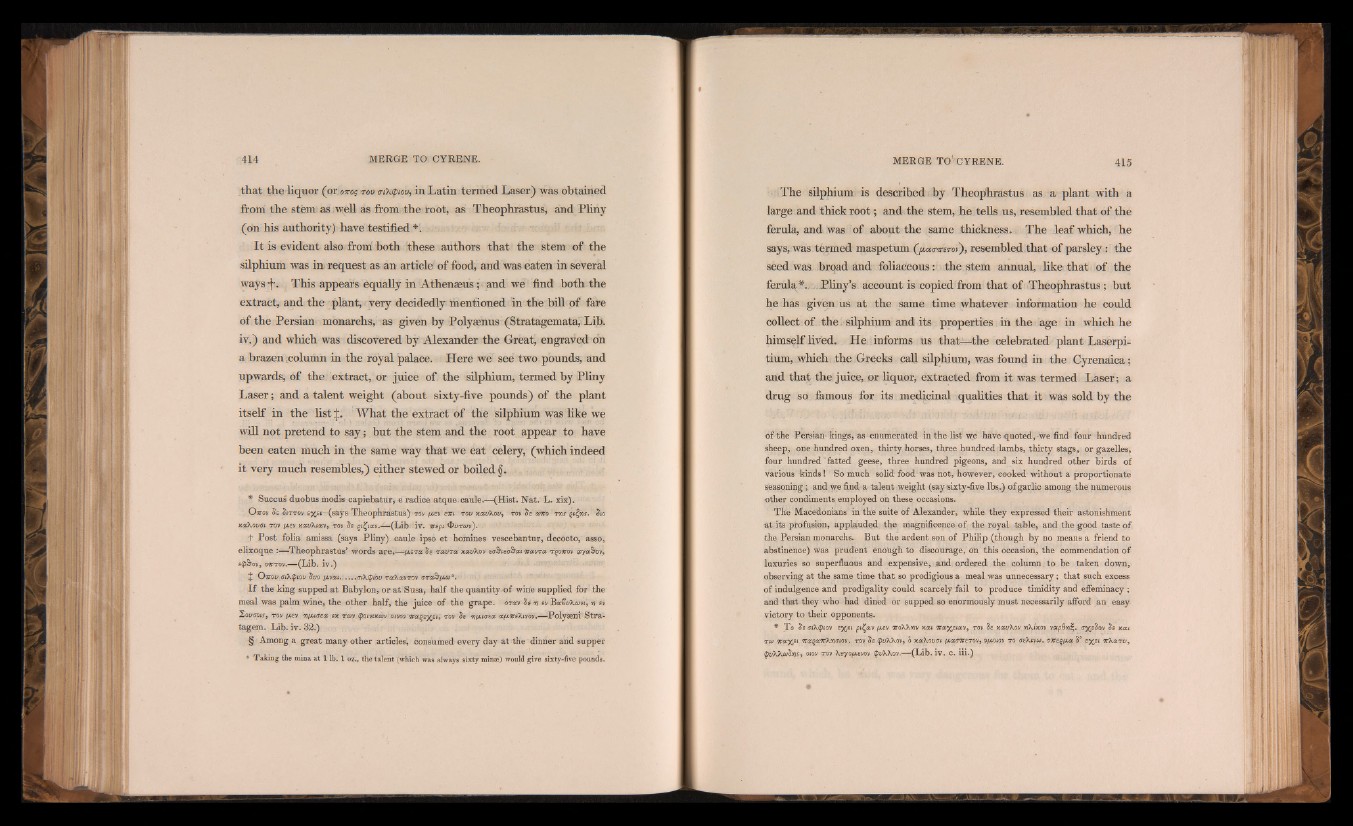
that the liquor (or « 0; r o v triKpiov, in Latin termed Laser) was obtained
from the stem as well as from the root, as Theophrastus, and Pliny
(on his authority) have testified *.
It is evident also from both these authors that the stem of the
silphium was in request as an article of food, and was eaten in several
ways-}-. This appears equally in Athenaeus;- and we find both the
extract, and the plant, very decidedly mentioned in the bill of fare
of the Persian monarchs, as given by Polyaenus (Stratagemata, Lib.
iv.) and which was discovered by Alexander the Great, engraved on
a brazen .column in the royal palace. Here we see two pounds, and
upwards, of the extract, or juice of the silphium, termed by Pliny
Laser; and a talent weight (about sixty-five pounds) of the plant
itself in the list J. What the extract of the silphium was like we
will not pretend to say; but the stem and the root appear to have
been eaten much in the same way that we eat celery, (which indeed
it very much resembles,) either stewed or boiled §.
* Succus duobus modis capiebatur; e radice atque.caule.—(Hist. Nat. L. xix).
O®ov Ss Sirrov e^si (says- Theophrastus)fdv #¿0 pki rov xtzvwv , rov Se aito rvis %i@ns. 'Sio
hoX o vo i rov {Aev xctuXiccv, rov 5s qityav.-t— (Lib. iv. wept <&vruv).*i' |
+ Post folia.' amissa (says Pliny) caule ipso et homines vescebantur, decocto, asso,
elixoque Theophrastus’ words are,—^/xsra 5s ravrcc xai/Xov eo§iea$ai Travra rqoitov ctyaSov,
e<f&ov, ovroy.—(Lib. iv.)
J O t t o v g iK Q io v 5yo [¿vat.;. . .atktyiov rctXavrov aro&iXM*.
If the king supped at Babylon, oratSusa, half the quantity of wine supplied for the
meal was palm wine, the other half, the juice of the grape, orotv 5s w ev BafyX&m, *1 ev
Soncmr, rov [¿ev ^[¿laett ex ra y tyoivixMv 01 vov rov 5s n/xioecc «//.TTsXivov,—Polyaeni Stratagem.
Lib. iv. .32.)
§ Among a great many other articles^ consumed every day at the dinner and supper
* Taking the mina at 1 lb. 1 oz., the talent (which was always sixty minae) would give sixty-five pounds.
The silphium is described by Theophrastus as a plant with a
large and thick root; and , the stem, he tells us, resembled that of the
ferula, and was of about the same thickness. The leaf which, he
says, was tfermed maspetum (joaovenii), resembled that of parsley: the
seed was broad and foliaceous: the stem annual, like that of the
ferula*. ..Pliny’s account is copied from that of Theophrastus; but
he has given us at the same time whatever information he could
collect of the silphium and its properties in the age in which he
himself lived. He informs us that—the celebrated plant Laserpi-
tium, which the Greeks call silphium, was found in the Cyrenaica;
and that the juice, or liquor, extracted from it was termed Laser; a
drug so famous for its medicinal qualities that it was sold by the
of the Persian kings, as enumerated in the list w;e have quoted,-we find four hundred
sheep, one hundred oxen, thirty horses, three hundred lambs, thirty stags, or gazelles,
four hundred fatted geese, three hundred pigeons, and six hundred other birds of
various kinds! So much solid food was not, however, cooked without a proportionate
seasoning; and we find a talent weight (say sixty-five lbs.} of garlic among the numerous
other condiments employed on these occasions.
The Macedonians in the suite of Alexander, while they expressed their astonishment
a t its profusion, applauded the magnificence, of the royal table, and the good taste of
the Persian monarchs. But the ardent son of Philip (though by no means a friend to
abstinence) was prudent enough to discourage, on this occasion, the commendation of
luxuries so superfluous and expensive, and ordered the column.to be taken down,
observing at the same time that so prodigious a meal was unnecessary; that such excess
of indulgence and prodigality could scarcely foil to produce timidity and effeminacy ;
and that they who had dined or supped so enormously must necessarily afford an easy
victory to their opponents.
* To 5s oiXipiov e%ei pitav [¿ev ttoXXojv kou vtayjuoiv, rov 5s xat/Xov ojX/xov vccpQn^. <rp£s5ov 5s xai
reo <Kocy£i TtcLqa.Tfhtwiov. rov 5s (pyXXov, o xaXoyor /xaovrsTov, o/xotov ro asXjvw. airsg/xce 5* syjsi irXary,
tpuWcoSns, oiov rov Xsyo/xsvov <pi/XXov.——(Lib. iv. C. iii.)